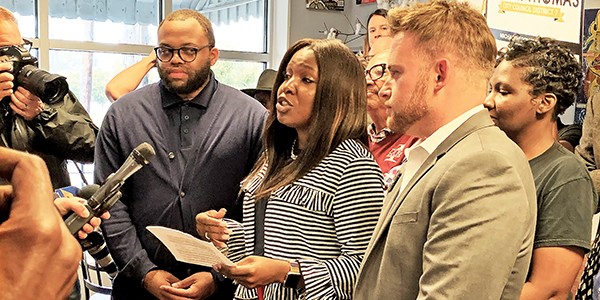Now that the “nonpartisan” city election is over and done with — as presumably it will be after two runoff elections for Memphis City Council seats, in District 1 (incumbent Sherman Greer vs. Rhonda Logan) and District 7 (incumbent Berlin Boyd vs. Michalyn Easter-Thomas), are completed this week — it is high time for local Republicans and Democrats to resume their more or less nonstop competition for influence in public affairs.
 Jackson Baker
Jackson Baker
Michalyn Easter-Thomas
Not that this rivalry really ceased for the city election. Although no candidate in the city general election was listed on the ballot under a party label, there were numerous races that were understood to be cases in which the two parties vied against each other.
One such was the race for Position 1 in Super District 9, between public school teacher Erika Sugarmon, a Democrat supported by Democrats, and developer Chase Carlisle, whose Republican sponsorship was equally obvious. There is a certain overlap between the white/black dichotomy and the partisan one, inasmuch as Shelby County’s whites, by and large, gravitate to the GOP, while African Americans constitute the vital core of the Democratic Party.
That fact makes the neck-and-neck race between Sugarmon and ultimate winner Carlisle all the more revealing. That contest was decided by a mere 531 votes out of 46,311 cast. Given the fact that Super District 9, roughly the eastern half of Memphis, is predominantly white, the obvious message is that of a potential racial and political parity there.
Underscoring the point is the legal matter of the bogus ballots — sample ballots in which endorsement space is sold to candidates on a pay-to-play basis. Carlisle and several other candidates who bore the official endorsement of the Shelby County Republican Party got themselves listed as well on two pay-to-play ballots put out under the auspices, respectively, of the Greater Memphis Democratic Club and the Shelby County Democratic Club, two shell enterprises which had no relationship to the actual Shelby County Democratic Party. Both ballots got heavy distribution, right up to the end of voting on Election Day itself, when, before the polls closed, a judge issued a restraining order on their further circulation.
It takes no great leap of logic to see that in an ostensibly nonpartisan race, the two sample ballots could have confused Democratic voters and accounted for the difference in the Sugarmon-Carlisle contest. (Interestingly, Special Judge William B. Acree of Jackson, who issued the restraining order on October 3rd, has scheduled a hearing in Memphis on Wednesday of this week — one day before the runoffs in District 1 and District 7 — to determine the future legality of pay-to-play ballots.)
In any case, next year, local voters will see overtly partisan contests — for legislative seats, one U.S. Senate seat, and presidential preference primaries. The last time the two parties took on each other directly, there was a much-vaunted “blue wave” nationally that favored Democrats. It didn’t help the party’s statewide candidates: Democrats Phil Bredesen and Karl Dean lost to Republicans Marsha Blackburn and Bill Lee for U.S. senator and governor, respectively. And while Democrats held their own in Memphis and came unexpectedly close in several suburban legislative contests, they failed to unseat Republican incumbents.
One exception was Democratic State Representative Dwayne Thompson, who was an upset winner in 2016 of the suburban District 96 seat and was re-elected in 2018. Party cadres expect Thompson to prevail again, as they made clear in a strategy session held on Tuesday night of last week in the Great Hall of Germantown and billed under the title, “How Liberal Are You? Winning in 2020 by Unifying the Left, the Far Left, and the Radical Left.”
Three seats in the state House of Representatives received special attention — Thompson’s in District 96 and those in two adjoining districts now held by Republicans. At least one Democrat, Jerri Green, has declared herself as an opponent of GOP incumbent Mark White in District 83. And Allan Creasy, who got 45 percent of the vote in District 97 last year, will try again for that seat, which is being vacated by Republican incumbent Jim Coley. Another possible Democratic contender for the District 97 seat is rumored to be Gabby Salinas, who gave Republican State Senator Brian Kelsey a close race in his 2018 re-election bid.
It would surprise no one to see tight races again.